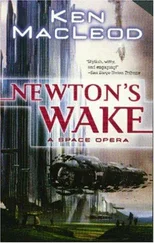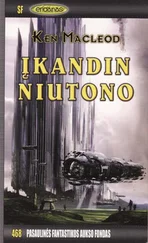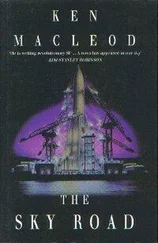Learning the World
by Ken MacLeod
Population will mightily increase, and the earth will be a garden. Governments will be conducted with the quietude and regularity of club committees. The interest which is now felt in politics will be transferred to science; the latest news from the laboratory of the chemist, or the observatory of the astronomer, or the experimenting room of the biologist will be eagerly discussed. […] Disease will be extirpated; the causes of decay will be removed; immortality will be invented. And then, the earth being small, mankind will migrate into space, and will cross the airless Saharas which separate planet from planet, and sun from sun. The earth will become a Holy Land which will be visited by pilgrims from all the quarters of the universe. Finally, men will master the forces of Nature; they will become themselves architects of systems, manufacturers of worlds.
—Winwood Reade,
The Martyrdom of Man , 1872
For convenience, some numbers used by characters who count in an octal system have occasionally been rendered in decimal. Terms derived from a dead scholarly language are rendered as if from Latin. There is an explanation for this.
Special thanks are due to Carol for giving flight to my characters, to Charles Stross for handwaving their limbs, to Farah Mendlesohn for helpful comments at various stages of the draft, and to Del Cotter for sending me a paper about world ships.
Some of the ideas and images were inspired by The Millennial Project , by Marshall T. Savage, and Reason in Revolt , by Ted Grant and Alan Woods.
Learning the World
14364:05:1217:24
The world is four thousand years old. I was eight years old when I found that out for myself. My name is Atomic Discourse Gale and this is the first time I have written something that anyone in the world can read. It is strange and makes me feel a little self-conscious, but I reassure myself that not many people will read it anyway.
14364:05:1318:30
That was a joke. I see I have a few readers. J – – wants to know how I found out the age of the world. It was six years ago now but I remember it quite well. I was very young then and didn’t understand everything that happened, but looking back I can see that it was a significant event in my life. That is why I mentioned it. So this is what happened.
“How old is the world?”
I asked my caremother. “I don’t know,” she said. “Why don’t you look it up?”
“I’ve looked it up,” I said. “I don’t believe it.”
“Why not?”
“Seventeen billion years?” I said. “That’s impossible.”
“Ah,” she said. “That’s the universe. Well… everything we can see. The stars and galaxies.”
I went off and formed a more careful query. Nothing came back. I returned to my caremother. “This world,” I said. “I can’t find anything about that.”
“All right,” she said. She pointed up to the sky. “See up there… where the sunline enters the wall? Inside there, in the forward cone, you’ll find what is called the keel.”
“Like the bottom of a boat?”
“In a way, yes. It’s really the base of the engine, and it’s the first part of the ship to be put in place. You will find the date of the final assembly there. And from that you can work out the age of the world.”
“You don’t know what it is?”
“No,” she said. She frowned, in the way adults have when they’re searching. “It isn’t in memory.”
“All right,” I said. “I’ll go and have a look.”
“Good for you,” she said. “I’ll help you pack.” So thirty minutes later I hitched my little rucksack, heavy with a litre of water and a kilo of sandwiches, onto my shoulders and set off to climb into the sky. I walked out of the estate and after a while I found a ladder at the edge of a dense and ancient clump of trees. The ladder had been familiar to me since I was much smaller, but none of us had ever climbed more than a few score steps on it. It soared into the sky like a kite string, the kinks of its zigzag flights smoothing into a pale line and then disappearing. You couldn’t easily fall off it — it had close-spaced rings around it, and every thirty metres or so there was a small platform and another flight. The first day I climbed a kilometre, found a big platform, ate my sandwiches and drank my water, and pissed in a far corner like an untrained kitten. I sat and watched the shadowline creep across the land towards me. It reached me in what seemed a final rush, and the sunline turned black. The land below was dim and beautiful in the farlight from the other side of the world, and within minutes lights pricked on all across that shaded scene. After a while I curled up and went to sleep. When I woke the sunline was bright again. It seemed as far away as ever, and the ground a long way below. I was just thinking of setting off back down when a crow landed on the platform, carrying a package.
“Breakfast,” said the bird. “And dinner. Your ma says hi.”
“Tell her thank you,” I said.
“Will do,” said the crow, and flew off. Crows don’t have much conversation. I unwrapped the package and found, to my great delight, hot coffee and hot berry-bread for breakfast, and a fresh bottle of water and another pack of sandwiches for later. As I ate my breakfast I let my clothes clean me. Normally I would have washed. The clothes did a reasonable job but made my skin feel crawly and tickly. After I had eaten I chewed a tooth-cleaner and gazed around. The estate looked tiny, and I could see a whole sweep of other estates and towns, lakes and hills and plains, along and around. I was almost level with the tops of the slag heaps piled against the forward wall. Between me and the sunline a few clouds drifted: far away, I could see rain falling from one, onto a town. It was strange to see rain from the outside, as a distinct thing rather than a condition. More interesting was to see aircraft flying high above me, and a few below, taking off or landing. I faced resolutely upward, and continued my climb.
Of course I did not climb all the way. I was a tough and determined person, but it would have taken a month even if the ladder had extended all the way there, which it did not. What happened, about halfway through my second day, was that a small aircraft landed on a large platform a few hundred metres above me, and when I reached it, a man stood waiting for me. He even reached over and took my hand and hauled me up the last few steps, which I thought was unnecessary, but I made no objection. He then backed away and we looked at each other for a few seconds. He was wearing a loose black suit, and his skin was not a lot lighter. His features might have been carved out of mahogany, with deep lines scored in it around the eyes and mouth. “My name is Constantine the Oldest Man,” he said. The name meant nothing to me but seemed suitable.
“Mine is Atomic Discourse Gale,” I said, sitting down on the platform.
“I know,” he said. “Your caremother asked me to meet you.” He jerked his head back, indicating the aeroplane. “I can take you to the keel, if you like.”
I had been determined to reach the keel myself; but I saw the man and the aircraft as part of my adventure, and therefore within my resolution rather than as a weakening or dilution of it. Besides, I now had a much better idea of how long it would take to climb all the way.
“All right,” I said. “Thank you.”
He stepped over and peered into my eyes. I noticed a tiny shake of his head, as if something that might have been in my eyes wasn’t there (a nictitating membrane, I now realise). He led me over to the aircraft, motioned me to sit in the front and lower seat, showed me how to strap up, and passed me a set of wraparounds, transparent and tinted. I slipped them on. He climbed in behind me and started the engine. The propeller was behind us both, the wing above. After the engine had built up some power the little machine shook and quivered, then shot to the edge of the platform and dropped off. I may have squealed. It dipped, then soared. My stomach felt tugged about. Wind rushed past my face. The collar of my jacket crept up over the top and sides of my head, and stiffened. I hadn’t known it had that capability.
Читать дальше












